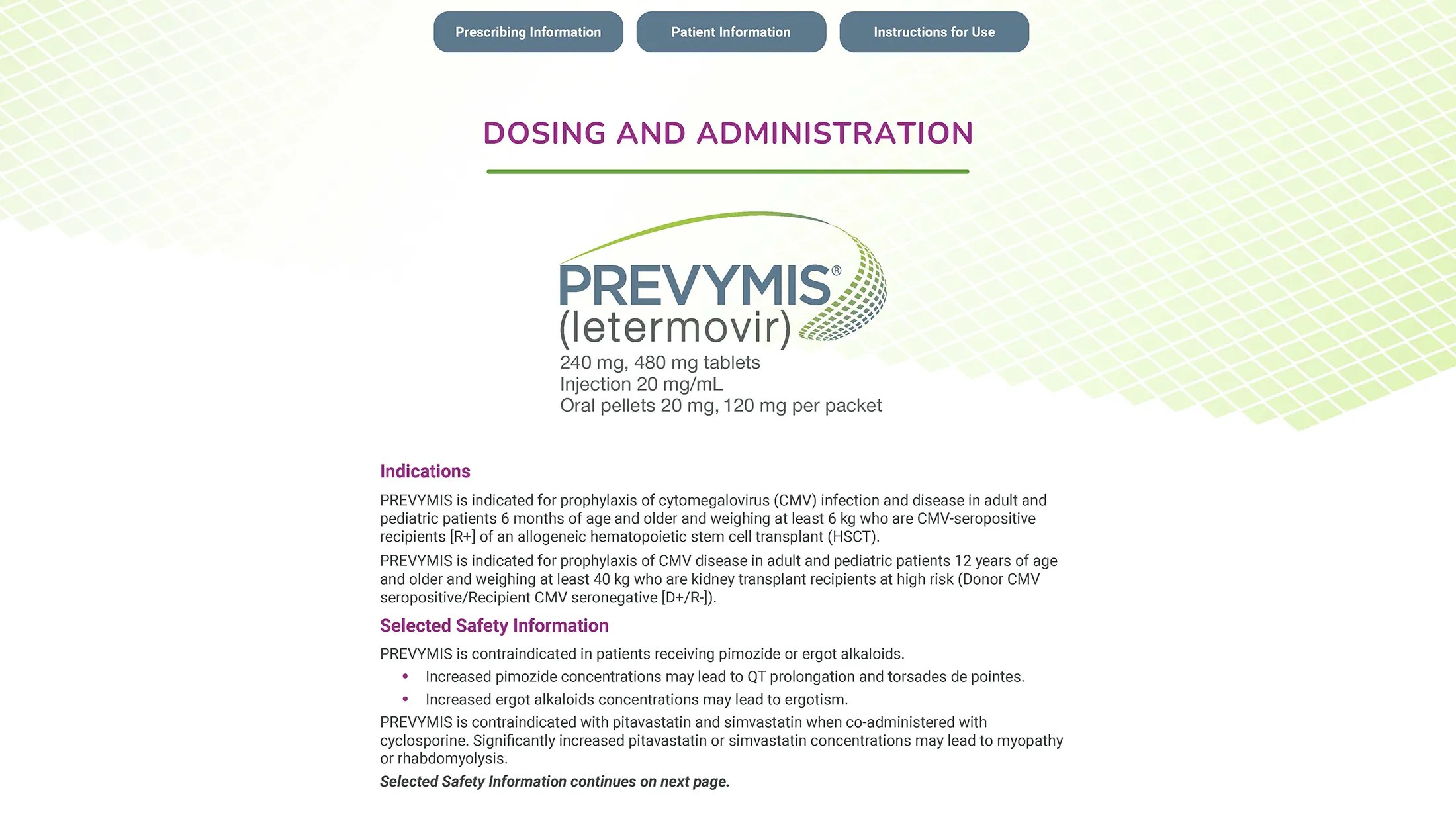Frequently asked questions about PREVYMIS® (letermovir)
For answers to questions you may have, select any of the topics below. To see a complete list of Q&As, scroll down.
What are the Indications and Usage for PREVYMIS® (letermovir)?
PREVYMIS is indicated for prophylaxis of CMV disease in adult and pediatric patients 12 years of age and older and weighing at least 40 kg who are kidney transplant recipients at high risk (Donor CMV seropositive/Recipient CMV seronegative [D+/R-]).
What is the Selected Safety Information for PREVYMIS® (letermovir)?
- PREVYMIS is contraindicated in patients receiving pimozide or ergot alkaloids.
- Increased pimozide concentrations may lead to QT prolongation and torsades de pointes.
- Increased ergot alkaloids concentrations may lead to ergotism.
- PREVYMIS is contraindicated with pitavastatin and simvastatin when co-administered with cyclosporine. Significantly increased pitavastatin or simvastatin concentrations may lead to myopathy or rhabdomyolysis.
- The concomitant use of PREVYMIS and certain drugs may result in potentially significant drug interactions, some of which may lead to adverse reactions (PREVYMIS or concomitant drugs) or reduced therapeutic effect of PREVYMIS or the concomitant drug.
- Intravenous formulation of PREVYMIS contains the excipient hydroxypropyl betadex. PREVYMIS injection should be used only in patients unable to take oral therapy and patients should be switched to oral PREVYMIS as soon as they are able to take oral medications. If possible, intravenous administration should not exceed 4 weeks.
- In patients with renal impairment, accumulation of hydroxypropyl betadex may occur. In adult patients with CLcr less than 50 mL/min and in pediatric patients with a similar degree of renal impairment (based on age-appropriate assessment of renal function) receiving PREVYMIS injection, closely monitor serum creatinine levels.
- Animal studies have shown the potential for hydroxypropyl betadex to cause ototoxicity. The active ingredient, letermovir, is not known to be associated with ototoxicity.
- The rate of adverse events occurring in at least 10% of adult HSCT recipients treated with PREVYMIS and at a frequency at least 2% greater than placebo were nausea (27% vs 23%), diarrhea (26% vs 24%), vomiting (19% vs 14%), peripheral edema (14% vs 9%), cough (14% vs 10%), headache (14% vs 9%), fatigue (13% vs 11%), and abdominal pain (12% vs 9%).
- Hypersensitivity reaction, with associated moderate dyspnea, occurred in one adult HSCT recipient following the first infusion of IV PREVYMIS after switching from oral PREVYMIS, leading to treatment discontinuation.
- The most common adverse event occurring in at least 10% of adult kidney transplant recipients treated with PREVYMIS and at a frequency greater than valganciclovir was diarrhea (32% vs 29%).
- The safety profile of PREVYMIS in pediatric subjects was consistent with the safety profile observed in clinical trials of PREVYMIS in adults.
- If PREVYMIS is co-administered with cyclosporine, the dosage of PREVYMIS should be decreased to 240 mg once daily.
- If PREVYMIS is co-administered with cyclosporine in pediatric HSCT patients less than 12 years of age, dose adjustment may be required.
- Co-administration of PREVYMIS may alter the plasma concentrations of other drugs and other drugs may alter the plasma concentrations of PREVYMIS. Consult the full Prescribing Information prior to and during treatment for potential drug interactions.
- Closely monitor serum creatinine levels in patients with CLcr less than 50 mL/min using PREVYMIS injection.
- PREVYMIS is not recommended for patients with severe (Child-Pugh Class C) hepatic impairment.
- The safety and effectiveness of PREVYMIS have not been established for:
- HSCT recipients less than 6 months of age or weighing less than 6 kg, or
- Kidney transplant recipients less than 12 years of age or weighing less than 40 kg.
- For patients with creatinine clearance (CLcr) greater than 10 mL/min (by Cockcroft-Gault equation), no dosage adjustment of PREVYMIS is required based on renal impairment. The safety of PREVYMIS in patients with end-stage renal disease (CLcr less than 10 mL/min), including patients on dialysis, is unknown.
Where can I find the recommended dosing for PREVYMIS® (letermovir) for my appropriate patients?
View HSCT dosing page for more information
View kidney transplant dosing page for more information
View the Prescribing Information

Download the Dosing and
Administration Card
What is PREVYMIS® (letermovir)?
PREVYMIS is an antiviral approved for CMV prophylaxis in the following high-risk transplant patients:
- HSCT adult and pediatric patients 6 months of age and older weighing at least 6 kg who are CMV-seropositive recipients [R+]
and
- Kidney transplant adult and pediatric patients 12 years of age and older and weighing at least 40 kg who are Donor CMV seropositive/Recipient CMV seronegative [D+/R-]
PREVYMIS inhibits the CMV DNA terminase complex (pUL51, pUL56, and pUL89) which is required for viral DNA processing and packaging.
When did PREVYMIS® (letermovir) receive FDA approval?
PREVYMIS received initial FDA approval in 2017 for adult CMV-seropositive recipients [R+] of an allogeneic hematopoietic stem cell transplant (HSCT).
What drug class does PREVYMIS® (letermovir) belong to?
The drug class is antiviral.
Is there additional information to help me understand my patients’ coverage for PREVYMIS® (letermovir)?
Yes. The Merck Access Program for PREVYMIS may be able to help answer questions about insurance coverage for patients, benefit investigations, and the prior authorization and appeals process.
Is there a coupon available for PREVYMIS® (letermovir)?
Yes. Eligible, privately insured patients may pay as little as $15 per prescription on each of up to 8 qualifying prescriptions for up to a one-month’s supply per prescription. Maximum savings is $2,500 per prescription.
Your patients can visit PREVYMIS.com to request a coupon, and if eligible, activate and bring to their pharmacy along with their prescription.
Not valid for patients who are uninsured or patients with Medicare or other Government Program insurance. Not all patients are eligible. Certain restrictions apply. Tell your eligible, privately insured patients to visit PREVYMIS.com to review the Terms and Conditions.